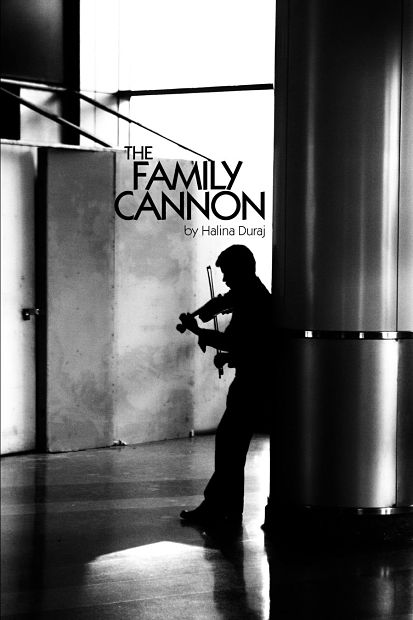The Family Cannon
The Family Cannon is Halina Duraj’s debut short story collection on family, loyalty, and fidelity. The collection of ten stories revolve around Magda, a 20-something woman (perhaps modeled after the writer herself?) and her immigrant parents from Poland who survived the Nazis and WWII. The father immigrates to the United States after the war and, in a few years’ time, visits his birth country to find a wife. The stories do not follow a narrowly defined linear trajectory; The Family Cannon is Halina Duraj’s debut short story collection on family, loyalty, and fidelity. The collection of ten stories revolve around Magda, a 20-something woman (perhaps modeled after the writer herself?) and her immigrant parents from Poland who survived the Nazis and WWII. The father immigrates to the United States after the war and, in a few years’ time, visits his birth country to find a wife. The stories do not follow a narrowly defined linear trajectory; rather, they weave through the narrator Magda’s childhood, youth, and adulthood, touching upon chance encounters and life-changing turning points in her life. Each new story smooths out rough edges on the characters, fleshing out one imperfect detail after the other.
Duraj’s characters are at once recognizable—the quirky neighbors, the high school sweetheart, and later, hipster friends from academia. What makes these characters unique are the roles they play in shaping the immigrant experience of Magda and her first generation parents in Middle America. At first glance, some characters seem hackneyed. The immigrant father is hard working, chauvinistic, dictatorial, and prejudiced. The mother is submissive and docile. And the daughter, mostly befuddled. But Duraj’s portraiture of Witeck Witecki, the father, and Pani Julka, the mother, go beyond the immigrant stereotype. In “The Painting,” Duraj paints a vivid picture of the young Pani Julka—a seamstress who lives by herself and cherishes her freedom. “In Kudowa,” set several decades after “The Painting,” the daughter, now an adult visits her father, who is recovering from a stroke at a nursing home. Of him, she says, “He’s got this look in his eyes when they’re open, like he’s drowning inside himself and it’s not any kind of water we know.”
The story “Witness” is also set in the nursing home, and in it, Duraj explores the basic human need to barter stories, based even on the slimmest of shared pasts and histories. Magda’s father learns that another patient at the hospital is also a concentration camp survivor. The father has lost his power of speech to the stroke, but yearns to share his story with Sam, the survivor. The father’s narrative “. . .he crept out of the woods, crawled beneath a train, and clung to its underbelly for the fifteen-hour ride into Czechoslovakia and freedom” is embellished and trimmed to suit his sense of self. Magda’s eventual acceptance of this and other frailties of her father showcases Duraj’s prowess at evoking the reader’s empathy for the harshness in her characters.
In “Survivors,” Duraj introduces a vignette about her family’s cat, Rusty to unveil yet another dimension of her parents’ relationship. She says, “My mother, I realize now, pronounced her defiance so quietly that either my father didn’t hear her or, suddenly understanding the dangerous unpredictability of the grief-stricken, wisely decided to say nothing at all.”
Duraj excels in first-person narrative in “The Company She Keeps,” which is about Magda’s faltering relationship with Jay, her fiancé. Jay’s indiscretions push the couple to the brink of dissolution, yet Magda tries everything to keep them together. On a trip to Yellowstone National Park, Magda “read books on fidelity and how to save a marriage after an affair. There are no books on how to save an engagement.” At the end of it all, Magda finds that, “Pain isn’t contingent on knowledge. The knowledge is, in fact, the beginning of the end of the pain.”
Overall, The Family Cannon is an honest and intimate portrayal of a family navigating the vicissitudes of life—from wartime Poland to 1950s postwar America, from a shackled childhood in suburban America to beer-induced dance binges in a Polish bar, and from a life of subservience to freedom. As Magda narrates these stories—a journey from childhood to adulthood and innocence to pain—we find that she is, in effect, imbuing her present with meaning derived from the past. And, in the end, isn’t that what life is all about?
Halina Duraj’s Magda, Witeck and Pani are you and me and the people we know. They represent the best and worst of us—a remarkable feat in a debut collection.





